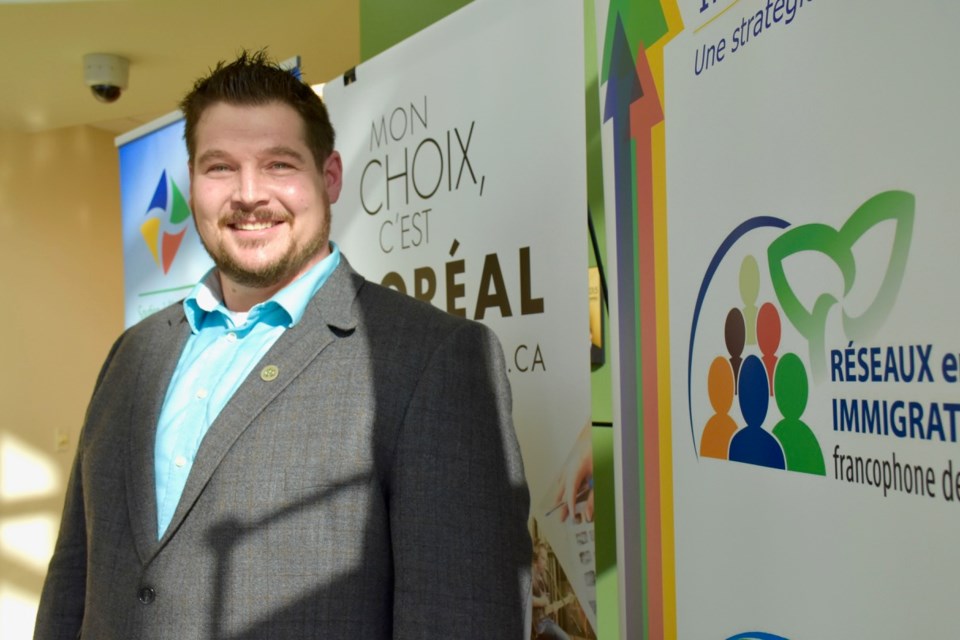With an aging workforce and not enough people to fill the jobs, international recruitment could help Northern Ontario businesses.
A session today at College Boreal in partnership with the Northern Ontario Francophone Immigration Support Network brought together about 20 Timmins-area employers from the manufacturing and mining industries, early childhood education, school boards and more to talk about recruiting international workers.
According to Far Northeast Training Board data, if all of the workers eligible for retirement by 2031 does so, it will mean nearly 150,000 people exiting the market, leaving a shortage of about 36,000 workers.
At The Reliable Group, corporate manager of health, safety and environment Peter Harkins said it’s already hard to find skilled labourers to fill holes in their business at all levels.
“We find there’s a depletion of young trades people coming in so we have to look at all opportunities for our business,” he said.
Right now, Harkins said the demographic in the work force is about 50 years.
“We depend so much on retirees, for example, to maintain our business but that’s not sustainable in the long term,” he said.
Along with attracting younger workers in the competitive market, he said they’d also like to hire more women in the trades.
With locations in Timmins, Kapuskasing and Smooth Rock Falls, the company faces unique challenges. For the Smooth Rock and Kapuskasing, he said it’s almost impossible to find a labourer to do civil work.
Without an existing pool of workers, exploring the possibility of international recruitment is something Harkins said the company has to do.
The lunch-and-learn session at College Boreal featured representatives from the Canadian Embassy in Paris who work for the Canadian Ministry of Immigration, Refugees and Citizenship, as well as people from the Ontario Ministry of Citizenship and Immigration.
Christian Howald, Northern Ontario Francophone Immigration Support Network project co-ordinator, said every year there are fairs in Paris and Brussels to recruit qualified workers to Canada.
“What we’re here to show is that there’s no risk and there’s no fear to hire qualified (French) speaking immigrants because it will help diversify the economy and also help bring new jobs and make links across the world which also help develop more industry potential,” Howald said.
College Boreal Timmins director Jean-Pierre Nadon explained that the strategy also includes linguistic training.
“Because we know Ontario, the majority is Anglophone, so we want to create a level of workforce that will be able work in those businesses so that means they will be bilingual,” he said.
“We want to make sure that the people we are bringing will meet the demand or the need of the employer today in Ontario.”
Post-secondary institutes in the area are already drawing in people from across international borders.
“In Northern Ontario we get about 500 immigrants per year, but we’ve managed to attract 2,000 international students a year. So the idea is now let’s develop a community process for them to be able to stay,” Howald said.
Retention and growing the community is part of council’s role.
“There’s been a lot of focus this term in improving the quality of life and when you look at things we’re working on like the multi-recreational centre or the festivals that are put on throughout the community, those are all tying into part of the quality of life,” said Timmins Mayor Steve Black.
“Obviously for people moving Timmins there’s a two-part focus which is the skills and the jobs required, which the colleges and Université de Hearst are working on developing, and the second is making sure we have a livable community that people enjoy and has the quality of life that they want to stay and raise a family in or stay and work in and that’s what we try to do at the city.”
He noted that Northern Ontario has challenges when it comes to the number of people retiring.
“Any time we have the opportunity to work on one of these programs to promote attraction of immigrants to the community and to the region is a benefit and if we can attract bilingual immigrants to the region that’s obviously a big plus for where we’re located and the importance of both languages here in our region,” he said.

